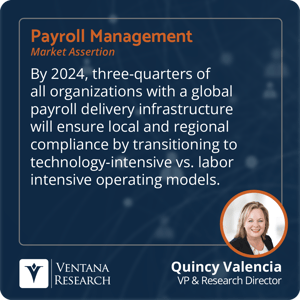Payroll Management is one of the six major focus areas in the Human Capital Management research and advisory practice at Ventana Research. “Continuous payroll” is a hot topic in this area, with much discussion about the always-on nature of this enhanced payroll function and its related demands for supporting technologies. Advancements in payroll technologies and practices have paved the way for off-cycle payroll transactions and pay modes – like earned wage access, for example – to become the new normal. Injecting continuous payroll practices into global organizations operating in multiple countries, each with its own pay-related laws, regulations and customs, requires complex functionality that many payroll systems simply do not have. Managing global payroll requires expertly maximizing human knowledge and intelligent systems to meet both international and regional requirements.
Aside from paying workers in local currencies, satisfying a range of regional compliance and service delivery requirements is core to the global payroll function. Labor laws and tax regulations in countries around the globe vary at the person-level based on compensation details, age, family status and other demographic or profile data. These complexities, managed by global payroll providers, are above and beyond the need for finance and accounting areas to handle other operational and regulatory aspects of payroll, such as the various types of payments and reimbursements to workers that must be included when reporting to the taxing authorities of all relevant countries.
These complexities are so vast that we assert that by 2024, three-quarters of all organizations with a global payroll delivery infrastructure will ensure local and regional compliance by transitioning to technology-intensive versus labor-intensive operating models.
compliance by transitioning to technology-intensive versus labor-intensive operating models.
Given all the demands a global payroll operation must contend with, and the fact that related business drivers and strategic objectives can vary from organization to organization, various approaches have emerged for using payroll systems, tools, data and subject matter experts to effectively execute on the mandate of a global payroll function. The selected approach is generally driven by the size and complexity of the organization employing it.
One option is a payroll portal front end, which serves as a single, two-way communication platform for accessing, combining and utilizing payroll data from around the globe. Also popular is the global payroll application framework and platform, which is used to effectively deliver cloud-based payroll services and address all global and local requirements across a large set of countries. This is done through real-time or near real-time integrations with commercial payroll software platforms in order to process relevant inputs and transactions all the way to payment.
Commercial global payroll software is the most popular approach for operating a global payroll function within larger organizations, outside of the outsourcing of the payroll function entirely. Organizations that choose this option are generally willing to spend more on technology in order to have the most direct, efficient and nimble tools to manage regional and global reporting, analysis, interface and compliance requirements.
Each of these models can be effective, but all have limitations. The payroll portal front end is limited by the organization’s ability to conduct data mapping and conversions to address global reporting, analysis and compliance matters. The global payroll application framework usually involves many rules-based engines for handling region-specific transactions, reporting, compliance and systems interface requirements as well as supporting the payroll-related needs of smaller locations where commercial systems are not in use, all of which carry individual challenges and risks. Even the commercial global payroll software model, while often viewed as the most sophisticated option, still has limitations. No current global payroll system provider covers all countries of the world with one solution. This necessitates inter-operation with other systems or software, and that adds to overhead costs and, potentially, challenges with execution. Ultimately, the global payroll model and technology an organization chooses usually depends on a balance of operating complexities, longer-term strategic business expansion plans, and, of course, cost. In making the decision, user experience as well as the risks and costs associated with changing the model in the future – should business imperatives require it – must always be considered. A reputable global payroll provider with regional and local expertise, committed to operating within an organization’s existing and target geographies, will be able to partner with the buyer to optimize experience, mitigate risk and support change.
As a long-term operator in the talent acquisitions space, I would often say that, while important, there are no real recruiting emergencies. The same cannot be said about payroll. The role of the technology partner selected to support this critical function cannot be overstated. Organizations must carefully evaluate features, functionality and global experience and expertise to decide what will best support existing and future global payroll needs.
Regards,
Quincy Valencia

 compliance by transitioning to technology-intensive versus labor-intensive operating models.
compliance by transitioning to technology-intensive versus labor-intensive operating models.







